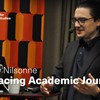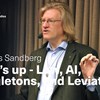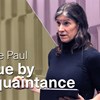neuroscience

Gustav Nilsonne: Pathways to an Open Science System. Replacing Academic Journals
Open science enables cumulative knowledge and facilitates discovery. The transition to an open science system is underway, but important roadblocks remain. A decentralised, evolvable network of platfo
Gustav Nilsonne: Pathways to an open science system: Replacing academic journals
Venue: Institutet för framtidsstudier, Holländargatan 13, 4th floor, Stockholm, and onlineREGISTERResearch seminar with Gustav Nilsonne, Associate Professor of neuroscience. He is active in meta-sciencOpen science enables cumulative knowledge and facilitates discovery. The transition to an open science system is underway, but important roadblocks remain. A decentralised, evolvable network of platforms interconnected by open standards, and governed by the scientific community, is technically feasible. However, academic researchers remain tied to traditional journals not least because assessment of merit is tied to the venue of publication. Ways forward can include redirection of funding from legacy publishing models to new infrastructure and the development of new methods to assess scientific contributions. Concerted action by stakeholders needs to be combined with pluralistic experimentation on policies and interventions to further open science practices.
Research seminar with Anders Sandberg: Serf’s Up: Law, AI, Singletons and Leviathan
Venue: Institutet för framtidsstudier, Holländargatan 13, StockholmRegister hereWelcome to this research seminar with Anders Sandberg, Ph.D. in computational neuroscience, researcher at IFFS and Senior

Anders Sandberg: Serf's up - Law, AI, Singletons and Leviathan
Research seminar with Anders Sandberg, Ph.D. in computational neuroscience, researcher at IFFS and Senior Research Fellow at the Future of Humanity Institute, Oxford University. Abstract A key problem

Laurie Paul: Value by Acquaintance
Laurie Ann Paul, Milestone Family Professor and Professor of Cognitive Science at Yale University. L.A. Paul's book Transformative Experience has sparked many discussions in philosophy since its publi
Joakim Sturup
I work at the Centre for Psychiatry Research, Department of Clinical Neuroscience, Karolinska Institutet and at the National Board of Forensic Medicine. My research focuses on major violent crime with
Value by Acquaintance with Laurie Ann Paul
Venue: Institute for Futures Studies, Holländargatan 13 in Stockholm Laurie Ann Paul, Milestone Family Professor and Professor of Cognitive Science at Yale University. L.A. Paul's book Transformative Expe has sparked many discussions in philosophy since its publication in 2014. In the book she describes how experiences wehave not had before can transform us in several ways – we can learn new things,and change our views radically – which, among other things, has implicationsfor decision-making.








